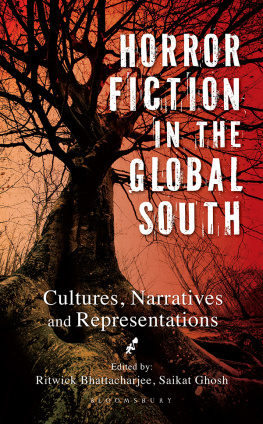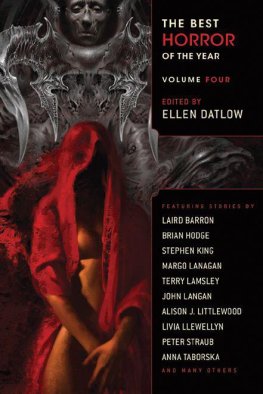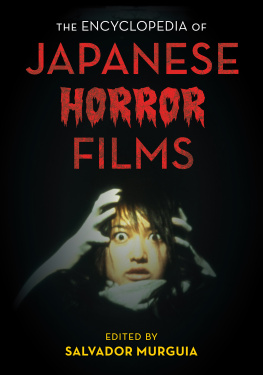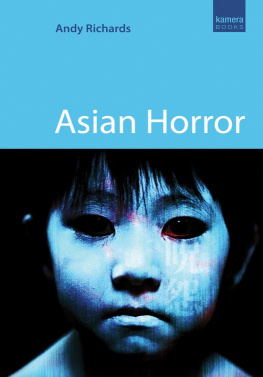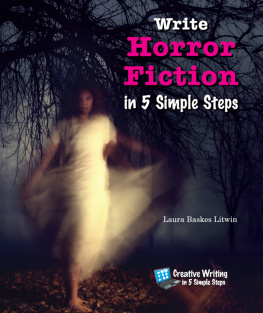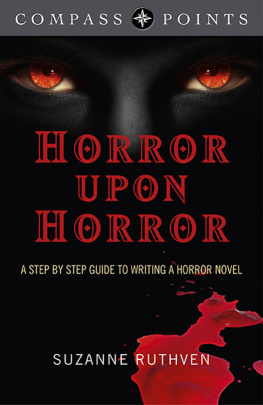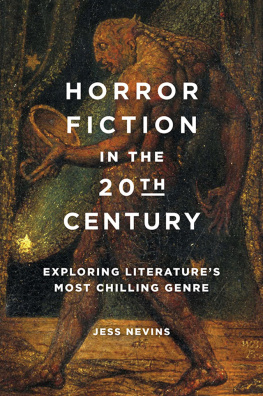Table of Contents
- Embodying Horror: Corporeal and Affective Dread in Junji Itos Tomie
Shweta Khilnani - Monsters of the Caribbean: Haunting Histories and Haunted Bodies in The Rainmakers Mistake and Soucouyant
Jarrel De Matas - Feminine Sexuality and Sexual Trauma in Bengali Horror Fiction: The Emergence of the Goddess
Puja Sen Majumdar - Spirits and Possessions
Rajarshi Bhattacharjee - Oriental Vampires vs. British Imperialists: Looking into the Figure of the Vampire in Bram Stokers Dracula and Richard Burtons Vikram and the Vampire
Meenakshi Sharma - Genres from the Orient: Instability in Shweta Tanejas Cult of Chaos
Samarth Singhal - The Corporeality of Horror: Spectres of War Victims in the Post-2003 Gothic Narratives from Iraq
Sushrita Acharjee - The Spectral Witness in Contemporary Indian Horror Cinema
Anhiti Patnaik - Conjuring an Atmosphere: A Study of Tumbbad as Folk Horror
Sakshi Dogra - Mythopoeia and Horror in the Global South: Reading Upamanyu Chatterjees Fairy Tales at Fifty
Srinjoyee Dutta - The Horror of Heteronormativity: The Supernatural in Vijaydan Dethas A Double Life
Aina Singh - Historic Time and Mythical Monsters: Negotiation of Mortality in M.T. Vasudevan Nairs Little Earthquakes
Meenu B - Funny Ghosts, Friendly Ghosts: A Study of How Indian English Pre-Teen Horror Fiction Turns Fear on Its Head
Anurima Chanda - Horror at the Margins: Phobic Essence and the Uncanny Home in Contemporary Asian Gothic Literatures
Soumyarup Bhattacharjee - Terror and Wartime Cosmologies in Liu Cixin
Krushna Dande

HORROR FICTION IN THE GLOBAL
SOUTH: CULTURES, NARRATIVES AND
REPRESENTATIONS
HORROR FICTION IN THE GLOBAL
SOUTH: CULTURES, NARRATIVES AND
REPRESENTATIONS
Edited by
Ritwick Bhattacharjee and Saikat Ghosh

BLOOMSBURY INDIA
Bloomsbury Publishing India Pvt. Ltd
Second Floor, LSC Building No. 4, DDA Complex, Pocket C 6 & 7,
Vasant Kunj, New Delhi, 110070
BLOOMSBURY, BLOOMSBURY INDIA and the Diana logo are trademarks of Bloomsbury Publishing Plc
First published in India 2021
This edition published 2021
Copyright Ritwick Bhattacharjee, Saikat Ghosh, 2021
Ritwick Bhattacharjee and Saikat Ghosh have asserted their right under the Indian
Copyright Act to be identified as the Editors of this work
All rights reserved. No part of this publication may be reproduced or transmitted in any form or by any means, electronic or mechanical, including photocopying, recording or any information storage or retrieval system, without the prior permission in writing from the publishers
This book is solely the responsibility of the author and the publisher has had no role in the creation of the content and does not have responsibility for anything defamatory or libellous or objectionable
Bloomsbury Publishing Plc does not have any control over, or responsibility for,
any third-party websites referred to or in this book. All internet addresses given in this book were correct at the time of going to press. The author and publisher regret any inconvenience caused if addresses have changed or sites have ceased to exist, but can accept no responsibility for any such changes
ISBN: HB: 978-93-90077-26-7; eBook: 978-93-90077-28-1
2 4 6 8 10 9 7 5 3 1
Created by Manipal Digital
Printed and bound in India
To find out more about our authors and books visit www.bloomsbury.com and sign
up for our newsletters
This collection of essays on horror in the Global South is a necessary and timely intervention. The essays take the best of existing research in the area and pivot it from a localised and rooted perspective. Based in philosophy, history, psychology and material understandings of postcolonial history and experience, all the essays offer diverse yet fundamentally coherent views and arguments explicating the specifically unique and different experiences of the Global Souths engagement with and experience of horror. In a sense, the book almost transcends the fact of theorising horror to explicating a theory of how the non-Western world experiences and negotiates the individual selfs relationship with the universe and cosmos in a larger metaphysical way.
Taking no vocabulary for granted, this collection interrogates and critiques all the terms it uses, from the Global South to the very basic understanding of the self and the cosmos. It is not only philosophical, however, for the arguments also unpack the very material and ideological conditions of experiencing, encountering and understanding the encounter with horrorfrom ghosts and demons to films, fiction and AI with references to very contemporary social and political currents. Overall, this anthology is a must-readnot only because it focuses brilliant academic attention on an under-researched area in non-Western academia but because it sheds light on many critical and crucial concepts.
Angelie Multani
Professor of Literature,
Department of Humanities & Social Sciences,
IIT Delhi
Tales of supernatural dread permeate cultural borders and inhabit the creative outskirts of every continent, lurking in the stories told at twilight and the films shown in dark theatres across the globe, but scholarly attention on the topic often disproportionately favours Western culture, which distorts the nature of horror on the global stage. Horror Fiction in the Global South challenges static notions of supernatural horror by adopting a global perspective on the genre, parcel ling out the subtle nuances of fear from various cultures in the Global South. This edited collection revitalises horror studies in surprising and groundbreaking ways, bridging cultural misnomers about the role of fear and the supernatural around the world. It is an outstanding collection of scholarship!
Sean Ferrier-Watson
Professor of English,
Collin College,
Frisco, Texas
The essays in this book analyse the theoretical framework of horror in the Global South. This is a perfect handbook for anyone who wants to critically dive into the uncharted reigns of horror literaturewriters and admirers alike. As mainstream horror is rooted in Western theories, Horror Fiction in the Global South tries to shine light on the representations of horror in Asia and the Indian subcontinent, while pertaining to the standards set by the Global North (as defined in the book). While doing so, it illuminates the reader with the various facets of horror literature, and at the end of the book, one shall get a sense of accomplishment and, perhaps, inspiration to venture into reading or writing horror fiction. Kudos to the writers for putting this together; it is a great service to Indian horror literature!
K. Hari Kumar
Screenwriter,
Author of Indias Most Haunted
It is a lamentable fact that horror has not received its deserved stature in India yet, and is routinely looked down upon as a poor cousin of other better-known genres of fiction. This collection of essays, Horror Fiction in the Global South, may well be a huge step in the direction of giving horror its due in both literature as well as film.
At the very outset, Horror Fiction in the Global South

